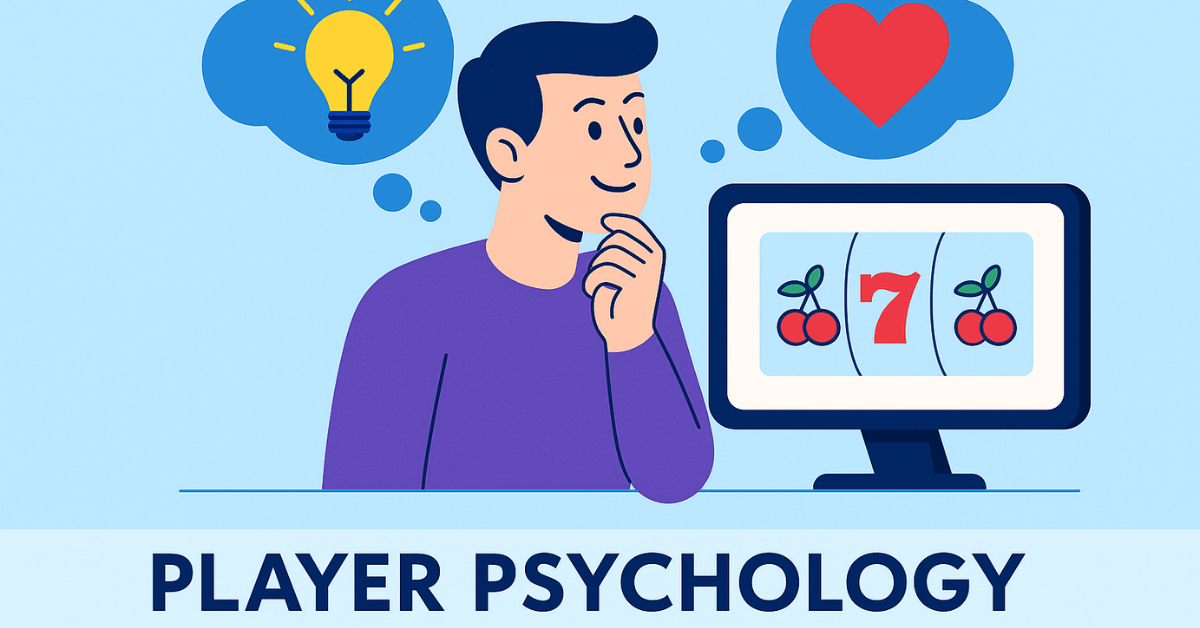
Player psychology in slot games is a powerful force — one that game developers and casinos understand deeply. If you’ve ever lost track of time playing slots or felt pulled back into a game despite losses, it’s not by accident. This article explores the psychological techniques behind slot machines and why they’re so effective.
🎰 1. The Foundations of Player Psychology
Slot games don’t just rely on math and chance. They are engineered experiences, tailored to engage your brain. Some key psychological concepts at play include:
- Variable Rewards – Slot machines are built on intermittent reinforcement. Wins come randomly, which creates stronger behavioral responses than predictable rewards.
- Near Misses – When the reels almost align for a big win, your brain sees it as a partial success. This triggers dopamine release, keeping you hooked.
- Losses Disguised as Wins (LDWs) – When a player wins fewer credits than their initial bet, but is rewarded with sounds and visuals, it feels like a win, even though it’s a loss.
🧪 2. Sound, Lights & Game Design Triggers
The multisensory design of slots is not accidental:
- Soundscapes are carefully engineered to induce arousal and anticipation. Winning jingles trigger a sense of reward, no matter how small the payout.
- Flashing Lights & Color Psychology – Bright colors and animations captivate attention and produce emotional highs.
- Pacing & Flow – The speed of spins, instant feedback, and simple UX design contribute to a state of “flow,” making it harder to stop.
🕹️ 3. Behavioral Hooks: Why You Keep Playing
Slot designers employ behavioral principles from psychology and behavioral economics:
- Endowment Effect – Once you invest money (and time), your brain assigns greater value to continuing.
- Sunk Cost Fallacy – Players often chase losses, believing a big win is “due,” despite each spin being independent.
- Illusion of Control – Features like “stop” buttons or picking bonus items give players a false sense of influence over outcomes.
🎁 4. Bonus Games & Personalization
- Bonus features tap into the brain’s craving for novelty and perceived skill.
- Tailored recommendations or favorite game tracking personalize the experience and make returning easier.
Developers also use progression systems—like leveling up, unlocking features, or earning badges—which mimic game mechanics in mobile or console games, creating stickier engagement.
🧠 5. Gamification & Addiction Risk
While gamification enhances entertainment, it also increases the risk of problem gambling.
- Streak rewards encourage daily play.
- Limited-time promotions trigger FOMO (fear of missing out).
- Psychological fatigue from endless small losses may reduce rational decision-making over time.
🧠 Understanding how player psychology in slot games works helps protect players and promote responsible gambling habits.
⚖️ 6. Balancing Fun with Awareness
Casinos are incentivized to create immersive games. But players must remain informed:
- Know the mathematical reality of slots — the house always has an edge.
- Use tools like reality checks, session timers, and deposit limits.
- Educate yourself on design psychology, so you’re playing for fun — not falling into a trap.
🧩 7. Responsible Gambling Tools That Help
- Self-exclusion options
- Take-a-break features
- Transparent RTP disclosures
- GamCare, BeGambleAware, and RG support links
Casino operators have a responsibility to highlight these tools clearly, especially in highly engaging games.
💡 8. The Role of Loyalty Programs in Player Retention
Many online casinos use loyalty schemes and VIP programs as psychological levers to maintain long-term player engagement. These programs reward consistent play with cashback, exclusive bonuses, personalized account managers, and invitations to real-world events. Psychologically, this creates a sense of progression and “status” — similar to leveling up in video games. Once players enter these tiers, they often feel incentivized to maintain their level, which increases time and money spent on the platform. From a behavioral standpoint, loyalty programs act as both rewards and traps if not used consciously.
🏁 Conclusion: Know What Drives the Spin
Slot machines are marvels of psychological engineering. From sound to reward mechanics, every element is designed to keep you engaged. But by understanding the principles behind player psychology in slot games, you gain control over your experience.
Play smart. Play for fun. And stay aware of the forces at work behind every spin.